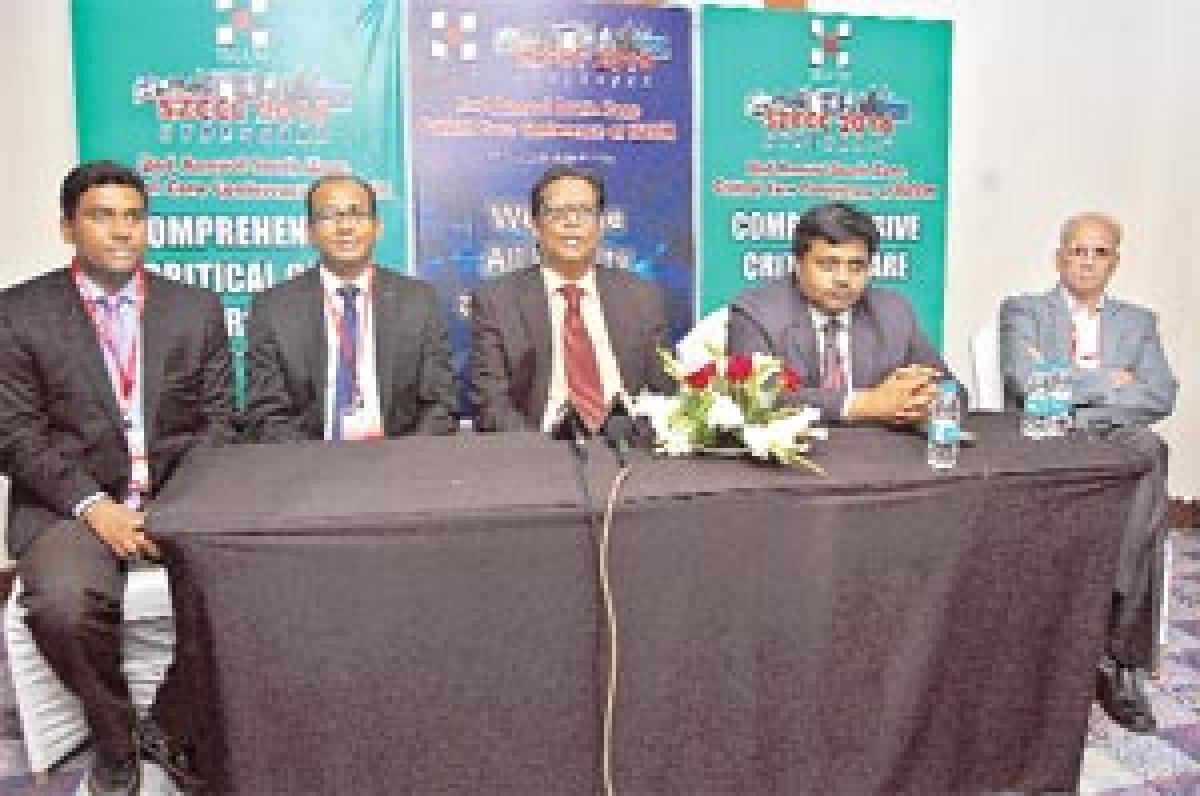Live
- Russia Launches Major Attack on Ukraine: 8 Dead, Energy Infrastructure Targeted
- Agency villages to get facelift under PM JANMAN scheme
- GITAM students excel in campus recruitment drive
- Sushmita Sen emphasises the power of action over intention
- Eating eggs could help boost memory in women, new study finds
- Youth booked under PD Act, shifted to prison
- Man’s Guide to Self-Care: The Ultimate Grooming Gift Guide for International Men’s Day
- ATP Finals: Jannik Sinner becomes first Italian to win Finals; season-ending event to be played in Italy till 2030
- Chief convener of CorWA elected
- ‘Iktaaraa Bole’ a collection of satires launched
Just In

The need for training young healthcare practitioners to create safe hospitals was highlighted at the two-day ‘South Zone Critical Care Conference’. Upto 500 doctors and 250 nurses attended the event, which concluded at Hotel Marriott on Sunday.
South Zone Critical Care Conference
The need for training young healthcare practitioners to create safe hospitals was highlighted at the two-day ‘South Zone Critical Care Conference’. Upto 500 doctors and 250 nurses attended the event, which concluded at Hotel Marriott on Sunday.
Dr Devishettym, Chairman of Narayana Hrudayalaya delivered the oration on “Cost Effective Delivery Of Cardiac Critical Care” during the conference. “ICU care is 24-hour management to support failing life functions.
It is very techno-intensive, performed by a highly specialised integrated team of doctors, nurses, paramedical staff and technicians. Perhaps the greatest factor in the management of ICU patients is the condensed time course of the disease processes, which in turn requires more frequent assessments and changes in therapy,” he said.
“With the present day advancement in medical technology, young doctors have to be trained to keep up the pace and improve the patient safety and better outcome,” said Dr Devishettym. “We doctors put a price tag on human life. Our endeavour is to make it affordable and reachable. Training young doctors and nurses is very essential to create safe hospitals,” he said.
Dr Shyam Sunder, Medical Director, Thumbay Hospital and Chairman of the Conference said, "There is a huge gap that will increase with time. Enormous healthcare spend is needed on primary healthcare, preventive care and specialty ICU care. Upto 30 to 40 per cent of the entire healthcare spend will go to specialty areas.
Not too many hospitals have the financial capability to build an ICU set-up which costs around 50-70 lakh per bed. Besides there aren't enough trained ICU personnel in the hospitals. Since the government cannot invest much in healthcare therefore private sector will have a major role to play in super specialty care."
Shortage of ICU beds in hospitals across the country, non-compliance in following protocols in critical care and the government's inability to meet the increasing demand of tertiary care, is likely to hit India's efforts at upgrading critical care in the country opined Dr PBN Gopal of Care Hospital .
Dr Srinivas J of Continental Hospital spoke about the commercial aspect of ICU. "If you look at the commercial aspect and financial viability of any ICU, I don't think any hospital can make huge profit out of its ICU services. To create proper infrastructure, supply qualified manpower and specialists is a very costly affair for any hospital,” he said.
“There is no harm to make profit out of those services. Every hospital cannot be managed with a philanthropic attitude but a quick patient turnover and adaptation of cost control mechanism can be considered as solution for this problem," he added.
Measures to avert crisis
- Comprehensive insurance plan by which ICU care is covered
- Closed ICUs are cost- effective. In this an intensivist manages the operation, makes decisions and ensures that they are applied in order to avoid multiple consultations.
- A pool of trained nurses and other paramedical staff.
- Formal critical care training should be a part of the medical school curriculum.

© 2024 Hyderabad Media House Limited/The Hans India. All rights reserved. Powered by hocalwire.com







